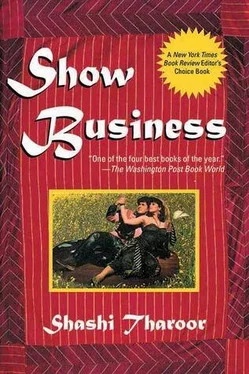The Guru pauses for breath. “Shabash,” I say, feeling like Iftikhar. “And adultery? What do you say to the chap who’s cheated on his wife, lied to her, kept a mistress? What do you say to the mistress?”
Tool looks at me like a lynx at midnight, seeing into my darkness. “Monogamy is a Western imposition,” he says shortly. “It didn’t exist in India before the British came. But that would be too easy.” He sounds sententious again. “The scriptures are full of examples of the noble heroes of our epics sleeping with more than one woman,” he intones. “Krishna is the obvious example — he loved sixteen thousand women, it is reliably recorded, and fathered, less reliably, eighty thousand sons. His greatest consort, his affair with whom is immortalized in painting and sculpture and dance all over India, was a married woman, Radha. Deception was therefore essential, though it was easier for a god than for other adulterers; once when Krishna spotted Radha’s husband shadowing her to one of their nocturnal trysts, he adopted the form of Kali, so that the spying cuckold saw his wife busy in adoration of his own favorite deity!”
“Krishna was a god,” I demur. “His rules were different. What about humans?”
“Arjuna embarked on one of the great erotic sagas of our history, traveling the length and breadth of India to expand his mind and expend his body. Even righteous Yudhisthira had at least three wives, and no one’s really counting. In fact, it is difficult to think of one hero from our Puranas, of one man who remained faithful to a single woman. My own contribution to national integration is that I have had congress with at least one woman from each of the twenty-two states and six Union Territories, including the Andamans — but then they went and annexed Sikkim.” He sighed. “So much to do. But I digress. The precedents are considerable, yes, even human ones. But,” he adds, anticipating my objection, “the postcolonial laws, regrettably, have enshrined this barbarism, what the cheerful Cheetah calls the monotony of monogamy, so lying and cheating become mandatory. Not to worry: the Puranas have an answer for that too. As Krishna explains to Yudhisthira in the Mahabharata:
In the matter of truth and deception,
There’s room for many an exception;
It’s all right to lie
In dharma, provi —
— Ded it’s in areas enjoined since Inception:
the protection of cows;
the fulfillment of vows;
defending either a marriage
or a Brahmin’s carriage;
but the most merit is earned,
where women are concerned.
In these cases above, be ambivalent,
For our theology’s quite polyvalent;
In every season
There can be a good reason
For a lie and Truth to be equivalent.
“You made that up,” I accuse him admiringly.
“The verse, yes, but every idea in it is gospel,” he swears. “Look it up. But in any case, AB, the Indian people never judged their gods by mortal standards. That’s why Krishna was worshiped for acting in ways his followers wouldn’t dream of tolerating in their own lives. Adultery, gluttony, theft, all came easily to the favorite deity of the Indian middle classes. But we’re not judgmental about our gods.” He smiled, more wickedly than wisely. “It’s much the same with you movie stars. You make the modern myths, so the same double standard applies to you. Your fans adore you for doing things they’d find shocking if their neighbors did them.” He looks at me searchingly. “So how do you like my Hindu hedonism? Will it play at the Prithvi?”
“They’ll lap it up,” I agree. “Especially the actresses.”
“Ah, the actresses.” A purply-pink tongue emerges from the midst of his graying foliage and licks a pair of dry mauve lips that briefly come into view. “I intend to explore with them the belief of the Alvar school twelve centuries ago that the soul, in its longing for God, must make itself female in order to receive divine penetration. The soul of an actress, I shall explain, starts off with a considerable advantage in this respect.”
“And you, I take it, will provide the divine penetration?”
“A mere mortal substitute, old soul. In anticipation of the sublimity of the spiritual process to follow.”
I shake my head in admiration. “You’ve come a long way, Tool, since the days when we used to chat up the co-eds by saying that we would live up to the ideals of St. Francis, who was kind to birds.”
“Who used to caress the birds.” Tool Dwivedi corrects me, shaking his head in turn. “You’ve obviously come a longer way, Ashok, if you started off being kind to them. But tell me, what can you do for me?”
“I’ll happily introduce you to my friends and producers,” I respond without hesitation.
“Good, but not directly,” the Guru says. “I don’t want too many awkward questions arising about our connection. St. Francis’ College is not a good background for a Hindu holy man who wants to be taken seriously in the West. Officially, I grew up on the mountainside at Rishikesh and the riverside in Benares.” The beard parts again in a smile.
“And I’m not sure,” he adds, sounding anything but unsure, “that it’ll do either of us any good to be publicly associated with each other. No, Ashok, I want to keep you up my sleeve. In fact, I don’t mind at all if you conspicuously keep your distance from me. Could be useful later on. But give me a few names and unlisted phone numbers. Tell me a few inside stories. Help me know in advance what’s likely to be bothering some of these people. Straying husbands. Suicide attempts. Family secrets. There’s nothing more impressive than surprising a prospective disciple with some startling piece of information you couldn’t possibly have had in the normal course of things.”
“You need Radha Sabnis, not me,” I reply. “But sure, I can give you some of that stuff. Just tell me when, and how.”
“We shall arrange an even more private audience in due course to exchange that information,” the Guru chortles. “In the meantime, tell me how I can help you.”
“You can repeat your endorsement in your Hindi session,” I suggest. “And —”
“Consider it done,” he cuts in. “They are probably already exchanging amazed whispers about your having the longest audience the Guru has ever granted. But I shall find a way of making it more explicit for the villagers.”
“Thanks. And in Bollywood you can help take someone off my hands who is getting just a little too awkward for me right now. She’s ripe for a religious experience. It’s just what she needs to take her mind off me.”
“I understand fully,” says the Guru. “I shall expect Ms. Elahi’s private phone number from you shortly.”
I shake my head again, in wonder and relief. This guy could end up solving all my problems.
Exterior: Day
MECHANIC
SYNOPSIS
Ashok is an automobile mechanic in Bombay, working in a garage repairing the big cars of the powerful (and the powerful cars of the big). One of the garages clients is an important politician, Pranay, whose pretty but spoiled daughter Mehnaz regularly drives in to get her red sports car serviced. Ashok’s attitude to her is an uneasy compound of gender attraction and class incivility. But one day (with smartly choreographed dishoom-dishoom ), he rescues her from assailants — and turns down the cash reward her father offers him. Mehnaz is smitten, Pranay resentful.
Ashok lives in a slum where, as the theme song makes clear, he is the popular solver of everyone’s problems:
Читать дальше












